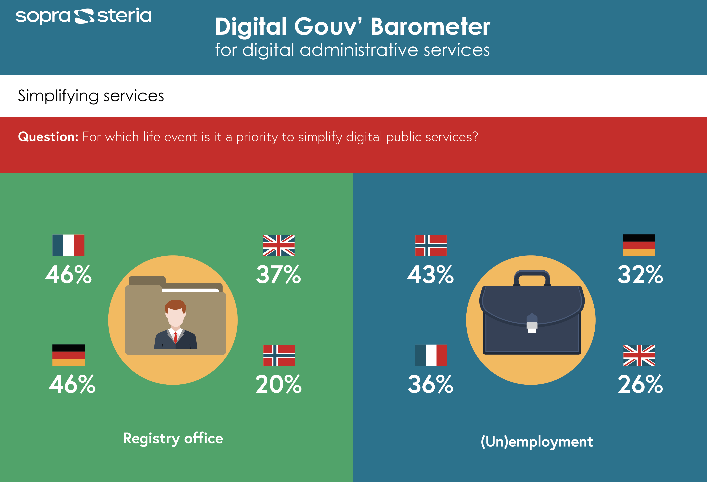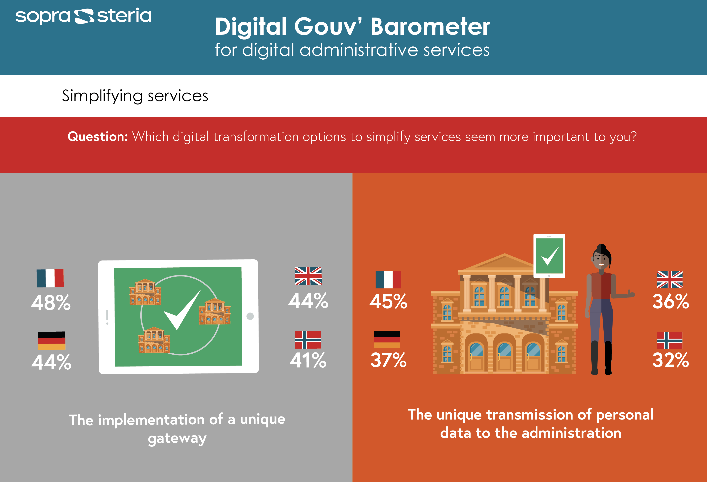Satisfied, but impatient citizens
- The majority of citizens think that the development of digital state and government services is progressing: France ranks second (66%) after Norway, which remains the benchmark (75 %), and ahead of the United Kingdom (64 %). The feedback in Germany is less positive: only 42% of Germans believe that digital transformation is progressing in their country.
- In France, the United Kingdom and Norway, the development of digital services is not just quantitative - a significant majority of citizens (between 83% and 85%) recognise that there are more and more tools and services available - but also qualitative: tools and services are becoming easier to use for 66% of French and British citizens, and for 76% of Norwegians. The Germans are more critical: just 56% of them think there are more digital tools and services available, with 43% saying they’re becoming easier to use.
- Finally, public services have nothing to worry about when it comes to their digital services: they’re judged to be beyond or at the same level as private-sector companies by 70% of French citizens, 66% of British citizens and 60% of Norwegians. Germany is behind on this issue (48%).
- Having said all this, there are considerable disparities between sectors: taxation was identified as an area of digital excellence in all of the countries. 84% of the French citizens surveyed deemed it to be the most advanced sector. In France, 65% also see social security as having made very good progress. Conversely, some sectors are lagging behind, more markedly In France than in the other countries: that’s especially the case for the courts and the police (advanced for just 34% of citizens), education and higher education (46%), health (49%) and jobs and unemployment (50%).
- These patchwork advances across the sectors are felt when using public services online. European citizens still only use them occasionally: once every 6 months or less for 73% of French citizens, 83% of British, 70% of Norwegians and 90% of Germans.
The digital transformation is everyone’s priority, so long as it simplifies our lives
- More than 7 out of every 10 European citizens believes that developing digital public services is a priority, especially in the health sector (cited as the top priority in all but Germany) but also, in France, in the areas of jobs and unemployment, and the civil registry. They have particularly high expectations when it comes to life’s most recurrent events (renewing documents or seeking treatment, for example) or stressful events (losing your job).
- Regardless of the domains or life events involved, digital transformation should go hand-in-hand with simplicity and guidance by implementing a single online port of call where users can access all administrative services (a priority for 48% of French citizens) and have access to a personalised citizen’s account (45%).
- Above all, citizens want personalisation. They want practical, flexible and fast services, which allow them to cut down on travelling (citied as the biggest advantage for 51% of French citizens), to do things when they want to do them (most important for 47% of British citizens, but also 38% of Norwegians and 44% of Germans) and to save time (51% of Germans, 47% of French, 37% of British and 36% of Norwegians).
“The results from this third Ipsos barometer for Sopra Steria clearly show that citizens are ready for the digital transformation of their public services. Now, they need to be developed quickly and most importantly, in a way which meets their needs: ‘Make my life easier and take account of my personal circumstances’. This message is coming across loud and clear from French citizens”, explains Claire Ducos, Head of Consulting Business Development, Sopra Steria Consulting.


Governments face an awaited social transformation
- In the four countries surveyed, the majority of citizens think that the government wants to move things forward (between 68% and 77%).
- In France more than anywhere, almost one in two citizens (46%) is confident that the government will succeed.
- Citizens from all four countries are expecting a significant digital transformation, an opinion shared by them all: almost 9 out of every 10 French, British, Norwegian and German citizens would like to be using online services now, doing more of their administration on the Internet. This enthusiasm is shared by the entire population, regardless of their geographical location, sex, age or profession. There are no great differences in expectations of digital, but it needs to be accessible.
- They see the benefits: intersecting data analysis to fight against fraud (a benefit identified by 74% to 89% of the population, depending on the country), making things easier and simpler (from 73% to 83%), making savings (from 70% to 81%)...
- ...but also have some reservations: developing online public services could make access more difficult, if not impossible, for some people (from 72% to 82%) and lead to accessibility problems for some civil servants (from 62% in the United Kingdom to 85% in Germany).
Governments need to focus digital development on simplifying procedures by putting citizens at the heart of the transformation, but also by offering customised support - to pre-empt any digital divide - and making digitalisation more meaningful. In France more than elsewhere, citizens feel confident and it is crucial for the future: digitisation needs to help fulfil a genuine ambition to transform public services.
“The majority of French citizens want to see public services being digitised, and the government should be pleased with progress so far. Having said that, there are considerable disparities between different sectors and the State does need to make sure that developments are happening across the board, especially where expectations are not being met,” emphasised Brice Teinturier, Deputy Managing Director of Ipsos France.
*Study carried out by IPSOS for Sopra Steria between 25 September and 4 October 2017, based on a panel of 4,001 individuals surveyed online in France, the United Kingdom, Norway and Germany, according to the sex, age, profession, urban area and region quota method.